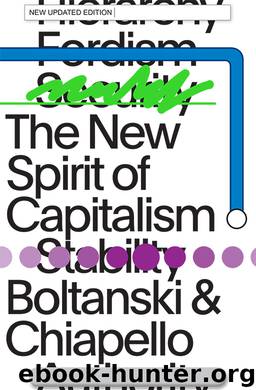The New Spirit of Capitalism by Luc Boltanski & Ève Chiapello

Author:Luc Boltanski & Ève Chiapello
Language: eng
Format: epub
Publisher: Verso
Overview of proposals for reducing connexionist exploitation
The mechanisms – or rather, proposed mechanisms – that we are going to examine do not counterpose domestic, civic or industrial forms of regulation to the expansion of network logics. On the contrary, what is interesting about them is that they rely on the network in order to limit the destructive effects of a connexionist world. In this sense, they are not derived from a ‘conservative’ critique seeking to restore a world that has gone for ever.
These proposals aim to tighten up the justice of connexionist tests of strength in order to transform them into tests of status in the projective city, not to replace them by tests of a different kind. This orientation explains why they must simultaneously maintain the flexibility of networks and, by recourse to law, secure better protection for social agents – in particular, those of them who are weak. The mechanisms envisaged are not intended to protect people by preventing them from being mobile, which would thwart the aspirations to autonomy or the requirement of flexibility that have become central in neo-capitalism, but to organize this mobility and the rounds of tests. What is at stake is making opportunities for displacement available to all, while accumulating fairly – that is to say, to start off with, being remunerated justly at each stage of the displacement. The mechanisms envisaged must therefore reconcile two temporalities: a short, discontinuous temporality, corresponding to the limited projects that temporary wage-earners must engage in to get paid; and a long, continuous temporality, which is that of people’s lives.
How can people circulate while accumulating and taking with them what they have amassed? We shall entertain two possibilities, associated with different types of justice from the projective city, while showing that neither is appropriate to a connexionist world.
According to a first possibility, which might be called domestic, people circulate in a familiar environment accompanied by an aura of good repute. Other than escaping from domestic restraints, this does not allow people to circulate very widely. It is not conducive to circulation in a vast world. A second possibility, based on a civic–industrial compromise, makes access to the collectives, whether occupations or statutes, with which privileges are associated dependent upon an educational title certifying an initial level of education. For circulation to be possible, work spaces must be structured in such a way as to inscribe in them a series of hierarchical positions that people can pass through in a certain order. This formula, which we may call industrial, is what the system of collective agreements rests on. But this form demands, on the one hand, strenuous efforts to establish equivalence, in order to homogenize the different portions of space and make them interdependent; and, on the other, job stability within large, planned firms, of a sort that is no longer appropriate in a world which people want to see composed of heterogeneous, independent units, where the different entities – persons, jobs, firms, products – are defined as changeable.
Download
This site does not store any files on its server. We only index and link to content provided by other sites. Please contact the content providers to delete copyright contents if any and email us, we'll remove relevant links or contents immediately.
| Anthropology | Archaeology |
| Philosophy | Politics & Government |
| Social Sciences | Sociology |
| Women's Studies |
The Secret History by Donna Tartt(19088)
The Social Justice Warrior Handbook by Lisa De Pasquale(12190)
Thirteen Reasons Why by Jay Asher(8910)
This Is How You Lose Her by Junot Diaz(6887)
Weapons of Math Destruction by Cathy O'Neil(6280)
Zero to One by Peter Thiel(5802)
Beartown by Fredrik Backman(5754)
The Myth of the Strong Leader by Archie Brown(5507)
The Fire Next Time by James Baldwin(5446)
How Democracies Die by Steven Levitsky & Daniel Ziblatt(5219)
Promise Me, Dad by Joe Biden(5153)
Stone's Rules by Roger Stone(5088)
A Higher Loyalty: Truth, Lies, and Leadership by James Comey(4964)
100 Deadly Skills by Clint Emerson(4925)
Rise and Kill First by Ronen Bergman(4789)
Secrecy World by Jake Bernstein(4753)
The David Icke Guide to the Global Conspiracy (and how to end it) by David Icke(4720)
The Farm by Tom Rob Smith(4513)
The Doomsday Machine by Daniel Ellsberg(4490)
